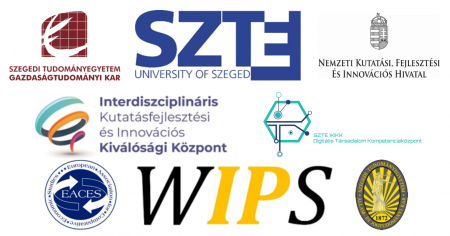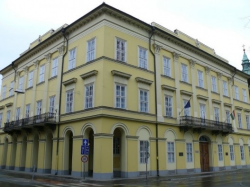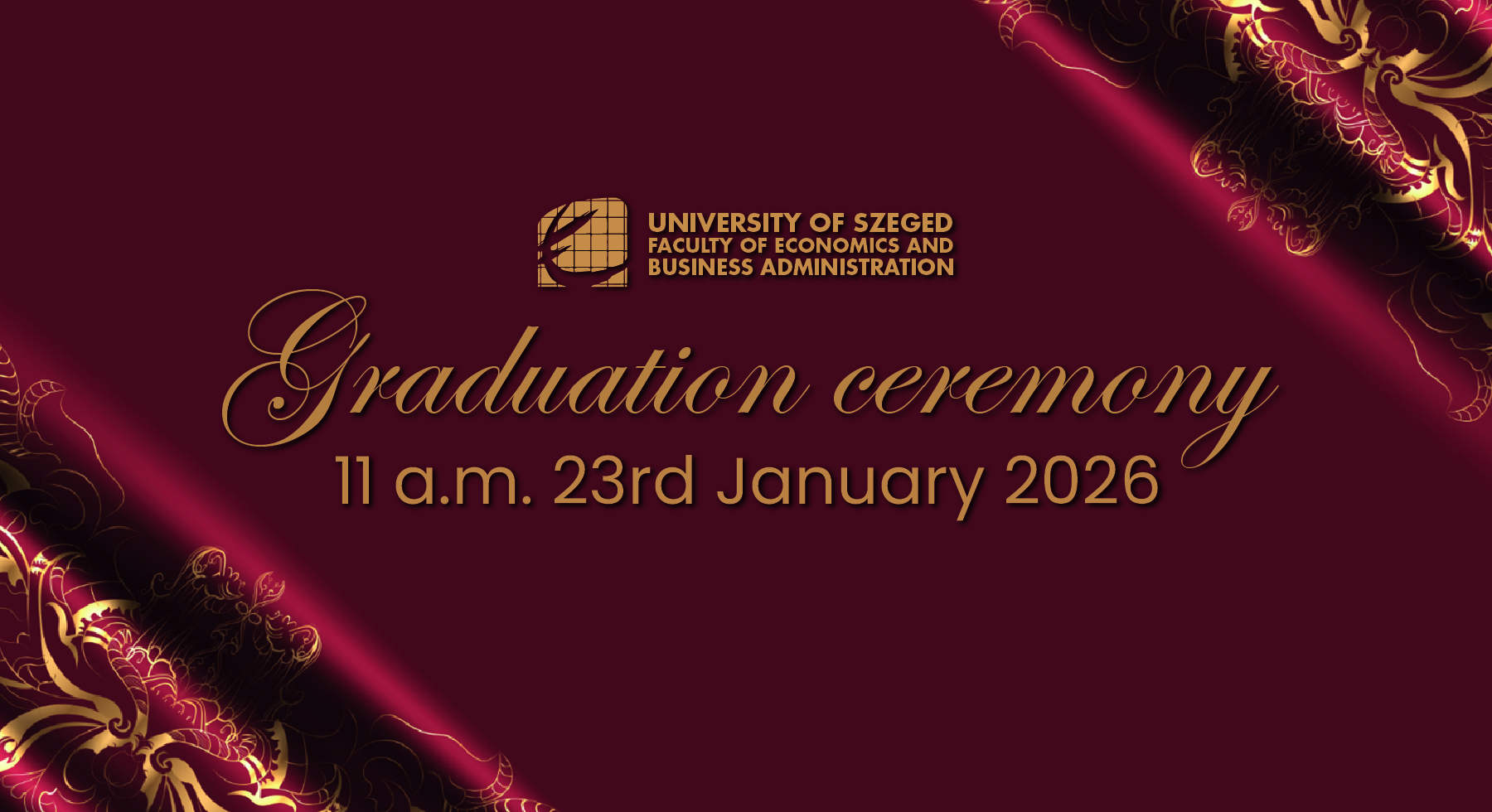Green and digital transition - 2025

Green and digital transition
The 7th Conference in cooperation with the European Association for Comparative Economic Studies
18 – 20 June 2025
The green and digital twin transition agenda was launched by the European Union in 2019. The ultimate goal is to achieve zero net carbon emissions by 2050, by which the EU strives to become the first climate-neutral continent. Successfully implementing the agenda requires intellectual creativity as well as the sharing of ideas and possible solutions to the challenge. In fact, vivid scientific and professional debates are being conducted about the issue EU-wide, while the EU and its member states are also taking numerous steps towards reaching the defined objectives.
Our conference addresses the main topic along three main tracks
-
EkonBiz - Economic and business aspects of the green and digital transition
The European Green Deal encompasses the green transition of the economy and the society. Importantly, in reaching the objective of the climate-neutral continent by 2050, digitalisation plays a crucial role while the essence of the Europe fit for the digital age strategy is that the digital transformation of the economy and the society shall benefit the citizens and the businesses, meeting the requirements of social justice and inclusivity at the same time. Therefore the green and digital twin transition is present in the design and implementation of various policies (e.g. agricultural policy, industrial and technology policy, energy policy, education, trade policy, regional policy, foreign policy, not to mention environmental policy), while it poses a large-scale legislation and regulation challenge and task, not independently of the society to which the policies and legislation apply.
-
LegPOL - Legal and political science aspects of the green and digital transition
The conference's Legal and Political Sciences Track (LegPOL) will examine the critical role of law and politics in advancing the European Union's green and digital twin transition agenda. The track invites legal scholars, practitioners, and policymakers to discuss how regulatory frameworks can address challenges posed by emerging digital technologies such as AI, blockchain, and digital twins in environmental governance. Key topics include essential state functions, democracy and data protection in sustainability applications, intellectual property challenges in green innovation, compliance mechanisms for environmental and digital regulations, and political implications of the green and digital transitions. LegPOL explores diverse perspectives, including cybercrimes targeting digital infrastructure, corporate negligence, and environmental offences facilitated by digital technologies. The political, ethical, and social implications of digital transformation, such as inclusivity and equity, will also be addressed. Presentations on the overlaps of intellectual property law, disruptive technologies and the circular economy will be organised within the WIPS (Workshop on Intellectual Property Law in Szeged) Faculty of Law and Political Sciences series. LegPOL encourages interdisciplinary dialogue and offers innovative solutions to these legal and political challenges. It will feature panel discussions, paper presentations, and networking opportunities, emphasising how legal systems and political processes can support the EU's dual transition agenda.
-
Humanities - Societal and human aspects of the green and digital transition
The green and digital transition has fundamental social and human consequences: a complete transformation of access to information and public services, which, in addition to further marginalising disadvantaged social groups, creates new marginalisation, especially for those less digitally literate. It is generating debates on teaching methods and content, from the point of view of pedagogy, equal opportunities and learning outcomes. We are also seeing alarming results in terms of the individual and social consequences of the digitalisation of society, such as the disintegration of communities, the increase in pseudo-relationships, the creation of single-member groups, the increase in polarisation, and the serious deterioration in the mental well-being and cognitive performance of individuals, especially the youngest age groups. In the social and human section of the conference, we invite papers that explore the ethical, (socio)linguistic, psychological, sociological, socio-psychological, political and philosophical implications of the green and digital transition.
▸ Papers in the fields of either economics & business studies, legal studies, or the humanities are welcome. Interdisciplinarity is appreciated.
▸ Papers as well as panel proposals can be submitted. Selected papers will be published after a peer review process in an online volume with an ISBN number.
▸ The Conference provides a dedicated track for PhD students.
|
Important dates |
|---|
| Abstract submission - EXTENDED |
31 March 2025 |
|---|
| Notification on acceptance | 11 April 2025 |
|---|
| Registration* - EXTENDED | 6 June 2025 |
|---|---|
| Preliminary programme | 2 June 2025 |
| Programme announced | 9 June 2025 |
|---|
| Full paper submission | 4 July 2025 |
|---|
| Review provided to authors | 31 July 2025 |
|---|
| Revised paper submission | 31 August 2025 |
|---|
* Registration fee: 25 EUR for presenting authors and PhD students, 50 EUR for non-presenting participants.
▸ Please send your abstract using the provided template to conference@eco.u-szeged.hu
▸ Registration is now open! You can register here.
Programme
18 June 2025
- 8:30 – 10:30
- Parallel sessions I
- 10:30 – 11:00
- Coffee break
- 11:00 – 11:15
11:15 – 12:45 - Welcome address
Keynote speech I - 12:45 – 14:00
- Buffet lunch
- 14:00 – 16:00
16:00 – 16:30 - Parallel sessions II
Coffee break - 16:30 – 18:30
- Parallel sessions III
Conference dinner
19 June 2025
- 8:30 – 10:30
- Parallel sessions IV
- 10:30 – 11:00
- Coffee break
- 11:00 – 12:30
- Keynote speech II
- 12:30 – 14.00
14:00 – 15:30
15:30 – 16:00
16:00 – 18:00
- Buffet lunch
Keynote speech III
Coffee break
Parallel sessions V
Farewell drinks
20 June 2025
- 8:30 – 10:30
- Parallel sessions VI
- 10:30 – 11:00
- Coffee break
- 11:00 – 13:00
- Parallel sessions VII
- 13:00 – 14.00
14:00 – 15:30
- Buffet lunch
Parallel sessions VIII
Keynote speakers

Dario Guarascio
Dario Guarascio is Associate Professor of Economic Policy at the Department of Economics and Law – Sapienza University of Rome - and external affiliate of the Sant’Anna School of Advanced Studies in Pisa and of the National Institute for Public Policy Analysis (INAPP). His research covers economics of innovation, digitalisation and labour markets, European economy and industrial policy. He has published in international journals as Economics Letters, Research Policy, Industrial and Corporate Change, Small Business Economics, International Economics, Journal of Evolutionary Economics, Structural Change and Economic Dynamics, Economics of Innovation and New Technologies, Cambridge Journal of Economics, Journal of Analytical and Institutional Economics and Intereconomics. He is Associate Editor of the journals Structural Change and Economic Dynamics, Journal of Industrial and Business Economics and Economia & Lavoro, and former member of the Commissions of the Ministry of Labour and Social Policy for the reform of social security, the promotion of women's employment and the regulation of digital labour platforms.
United in diversity? EU core-periphery divides at the time of the green transition

Taina Pihlajarinne
Taina Pihlajarinne (LLD) is a professor at the Helsinki University Faculty of Law. Her research interests are focused on the relationship between sustainability and private law, especially intellectual property rights, as well as on the impacts of digitalization and development of technology on intellectual property rights. She has published numerous books and articles and led several research projects on these themes.

Hannes Werthner
Hannes Werthner is a retired Computer Science Professor at the TU Wien, Austria, where he also served as the Dean of the faculty of Informatics. Prior to joining TU Wien, he had professorships at Austrian and international Universities. His research is in several fields such as Decision Support Systems, E-Commerce, E-Tourism and Recommender Systems. Besides research and teaching he is active in starting new initiatives, such as the Vienna PhD School of Informatics and the i2c (Informatics Innovation Center). In the area of E-Tourism, the International Federation for IT and Tourism (IFITT) grants the "Hannes Werthner Tourism and Technology Lifetime Achievement Award" to outstanding academics and/or professionals in the field.
He carefully observes how computer science and information technology are changing the world and us. This is his motivation for Digital Humanism, where he organized the Vienna Workshop of Digital Humanism, and he initiated the Vienna Manifesto in 2019. As a key figure of the initiative he co-edited the two books "Perspectives on Digital Humanism" and "Introduction to Digital Humanism", with over one million downloads.
Organizing committee
- Dr. Anita Pelle - Associate professor, Head of the Committee and the EkonBiz track
- Prof. Krisztina Karsai - Professor, Head of the LegPOL track
-
Prof. Klára Sándor - Professor, Head of the Humanities track
-
Dr. Edina Zvara - Associate professor
-
Dr. Sarolta Somosi - Assistant Professor
-
Giola Cami - PhD student
-
Mónika Zákány - Financial Officer
Venue
Hungarian Academy of Science, Szeged Regional Committee
Further information
University of Szeged, H-6722 Szeged, Kálvária sgt. 1. Hungary
E-mail: conference@eco.u-szeged.hu
Organiser: University of Szeged Centre of Excellence for Interdisciplinary Research, Development and Innovation, Humanities and Social Sciences Cluster, ICT and Societal Challenges Competence Centre
in cooperation with
University of Szeged Faculty of Economics and Business Administration
and
European Association for Comparative Economic Studies
The conference is supported by the Science Patronage Programme of the National Research, Development and Innovation Office of Hungary.
Project ID: MEC_SZ_149202.









